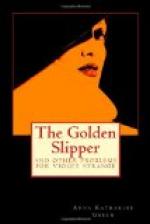Glancing first at the signature and finding it to be one already favourably known at the bar, she read with avidity the statement of events thus vouched for, finding them curious enough in all conscience to keep her awake for another full hour.
We here subscribe it:
I am a lawyer with an office in the Times Square Building. My business is mainly local, but sometimes I am called out of town, as witness the following summons received by me on the fifth of last October.
Dear sir,—
I wish to make my will. I am an invalid and cannot leave my room. Will you come to me? The enclosed reference will answer for my respectability. If it satisfies you and you decide to accommodate me, please hasten your visit; I have not many days to live. A carriage will meet you at Highland Station at any hour you designate. Telegraph reply.
A. Postlethwaite, Gloom Cottage, — N. J.
The reference given was a Mr. Weed of Eighty-sixth Street—a well-known man of unimpeachable reputation.
Calling him up at his business office, I asked him what he could tell me about Mr. Postlethwaite of Gloom Cottage, —, N. J. The answer astonished me:
“There is no Mr. Postlethwaite to be found at that address. He died years ago. There is a Mrs. Postlethwaite—a confirmed paralytic. Do you mean her?”
I glanced at the letter still lying open at the side of the telephone:
“The signature reads A. Postlethwaite.”
“Then it’s she. Her name is Arabella. She hates the name, being a woman of no sentiment. Uses her initials even on her cheques. What does she want of you?”
“To draw her will.”
“Oblige her. It’ll be experience for you.” And he slammed home the receiver.
I decided to follow the suggestion so forcibly emphasized; and the next day saw me at Highland Station. A superannuated horse and a still more superannuated carriage awaited me—both too old to serve a busy man in these days of swift conveyance. Could this be a sample of the establishment I was about to enter? Then I remembered that the woman who had sent for me was a helpless invalid, and probably had no use for any sort of turnout.
The driver was in keeping with the vehicle, and as noncommittal as the plodding beast he drove. If I ventured upon a remark, he gave me a long and curious look; if I went so far as to attack him with a direct question, he responded with a hitch of the shoulder or a dubious smile which conveyed nothing. Was he deaf or just unpleasant? I soon learned that he was not deaf; for suddenly, after a jog-trot of a mile or so through a wooded road which we had entered from the main highway, he drew in his horse, and, without glancing my way, spoke his first word:
“This is where you get out. The house is back there in the bushes.”
As no house was visible and the bushes rose in an unbroken barrier along the road, I stared at him in some doubt of his sanity.




